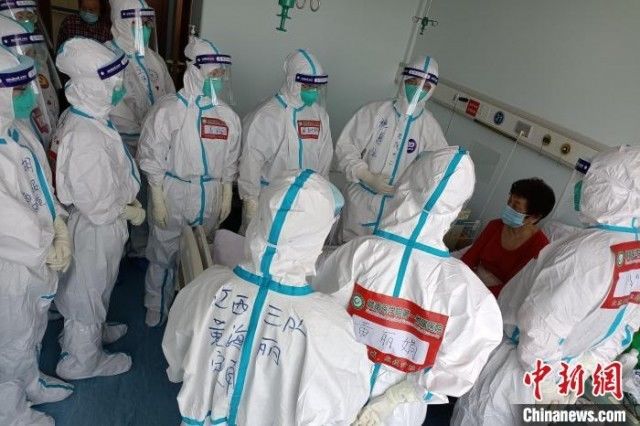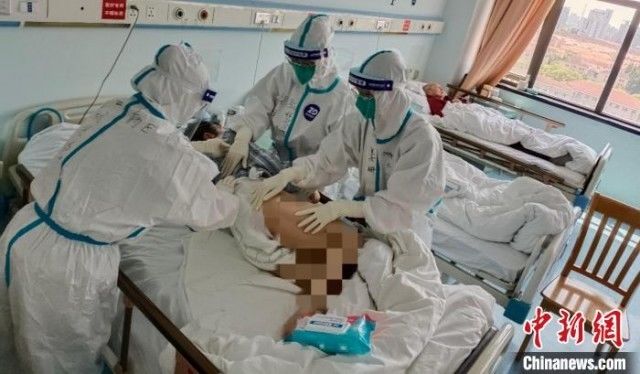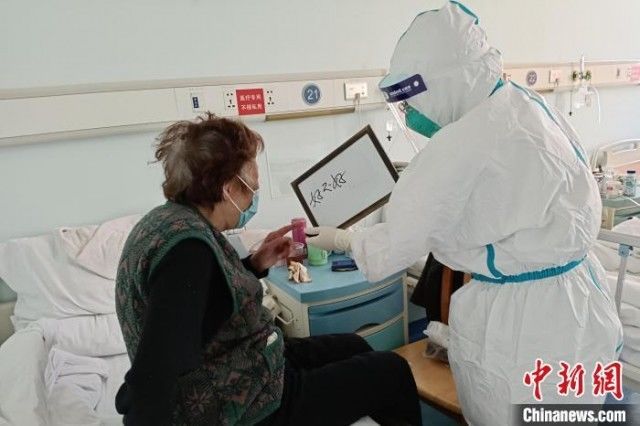
The nurses are especially attentive to the patients admitted to the “Double Care Ward”. Photo courtesy of Shanghai Ninth Hospital
China News Service, Shanghai, May 22 (Chen Jing Xuying) Among the elderly people suffering from new coronary pneumonia, there are many people who are disabled, demented, blind, and deaf (four deaf). The reporter learned from the Ninth People’s Hospital Affiliated to Shanghai Jiaotong University School of Medicine (Shanghai Ninth Hospital) on the 22nd that the designated hospital for the treatment of the new crown in the north of the hospital has specially set up a “double care ward” in Ward 12. So far, more than 20 “four-lost” elderly people have been treated in the “Double Care Ward”, and 19 have been discharged one after another.
Cao Guoliang, head of the ward, introduced that so far, more than 170 patients have been treated in the 12 wards of the northern designated hospital of Shanghai No. 9 Hospital, and more than 130 have been cured and discharged. Among them, more than 50% are patients over 80 years old, and 90 of them % have been cured and discharged. Cao Guoliang said that most of the elderly people in the ward were transferred from nursing homes and nursing homes, and many of them belonged to the “four-lost” elderly. The “Double Care Ward” in Ward 12 can treat 8 patients at the same time. This ward is located directly opposite the nurse’s station, and the nurses can keep an eye on the situation of the ward at any time.

From the oral care of bedridden patients, to changing diapers, turning over and patting the back, and feeding and washing the elderly with dementia, nurses are mainly responsible. Photo courtesy of Shanghai Ninth Hospital
It is understood that with the strong support of the hospital’s nursing department, the nurses in the ward are divided into a basic nursing group and a treatment nursing group. Nurses in the basic nursing group are mainly responsible for basic care such as patients’ life; nurses in the therapeutic nursing group are mainly responsible for the execution of therapeutic orders. Under the leadership of head nurse Zhu Lifang, the two groups of nurses achieved both a clear division of labor and seamless connection.
The Shanghai Ninth Hospital told reporters that the treatment work in Ward 12 implements the “in-cabin and extra-cabin joint diagnosis and treatment model” from beginning to end. Every day, Wang Haiya, the director of the geriatrics department outside the cabin, will organize experts in the department to discuss the patient’s condition based on the patient’s condition reported by the in-vehicle expert Cao Guoliang after the ward round, and at the same time adjust the individualized diagnosis and treatment plan according to the change of the patient’s condition. For some patients with severe anxiety and other psychological problems caused by diseases such as new coronary pneumonia, it will be adjusted to a “psychosomatic integrated in-cabin and extra-cabin joint diagnosis and treatment mode”.
“From the oral care of bedridden patients, to changing diapers, turning over and patting the back, and feeding and washing the elderly with dementia, nurses are mainly responsible,” said head nurse Zhu Lifang. The nurses are especially attentive.” The nurses usually need to provide professional oral and buttock care for these elderly people. When they do not want to take the initiative to eat, they will try to coax the elderly to eat, and eat small and frequent meals. When the patients with nasogastric feeding, they will formulate a nasal feeding plan; when the patient’s grandfather has a long beard, the nurses will find a way to get an electric shaver to shave the old man. Nurses said that seeing the elderly people not choking on food or drinking water, and the electrolyte indicators gradually corrected, it is very comforting no matter how hard or tired they are.

The treatment work in Ward 12 implements the “in-cabin and extra-cabin joint diagnosis and treatment mode” from beginning to end. Photo courtesy of Shanghai Ninth Hospital
Grandma Huang, who was discharged from the hospital today, has been blind for many years due to trauma. She has a history of hypertension for 7 years and has been associated with necrosis of the femoral head for many years. She has been found to have Alzheimer’s disease for 1 year. Her wife, Grandpa He, has a history of hypertension for 5 years. She has been degenerated in the cervical and thoracic spine for more than 60 years, and gastroesophageal reflux. 10 years. The two were sent to the northern designated hospital of the Ninth Hospital together on May 14 due to positive nucleic acid tests. After entering Ward 12, they were arranged to be admitted to the “double care ward”. Under the careful treatment and care of the medical staff, the new coronary pneumonia of the two elderly people was quickly cured. At noon on May 20, head nurse Zhu Lifang told them that they could be discharged home the day before Grandma Huang’s birthday on May 23.
After the old man’s son learned the good news that his parents were about to be discharged from the hospital, he expressed his deep gratitude to the medical staff of the Shanghai No. 9 Hospital in the ward and the five members of the third team of the Jiangxi Aid Shanghai Medical Team who had treated the two elderly together through WeChat.
The latest statistics from the designated hospital in the northern part of Shanghai Ninth Hospital show that since April 18, when patients with new coronary pneumonia were treated, as of 22:00 on May 21, the hospital has treated a total of 2,327 patients, achieving full coverage of traditional Chinese medicine intervention. On the 21st, 61 patients were admitted and 87 were discharged, and the number of admitted patients continued to be lower than the number of discharged patients. Among the 319 patients currently in the hospital, 0 are under 7 years old, 0 are 8-18 years old, 120 are 18-69 years old, and 199 are over 70 years old. (End)